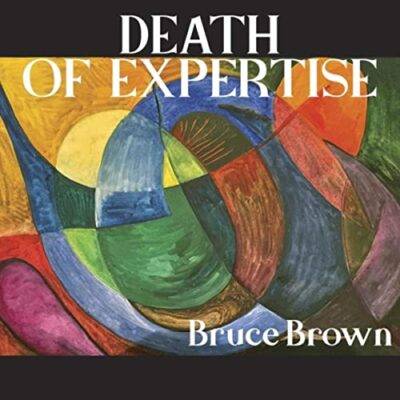Bruce Brown Death of Expertise
 Bruce Brown
Death of Expertise
Triangle 7
Herein lies another one of those interesting musical stories as vocalist/songwriter Bruce Brown, who was once a pianist too, found some new inspiration in songwriting, following recovery from a life-threatening stroke four years ago. Two decades ago, Brown was gigging in L.A. but has lived in New Zealand since. His latest collection of provocative songs on Death of Expertise display a witty cynicism, unbridled optimism, social commentary, and poignant reflections on life, his and life in general. He has a low-key Chet Baker-like vocal approach wherein he spins his tales backed by a small group of Australian and American musicians that he has known for years. They are John Harkins (piano), Brendan Clarke (bass), Andrew Dickeson (drums), Steve Brien (guitar), Steve Crum (trumpet), and Glen Berger (saxes and alto flute).
Rarely will you find romantic, joyous songs juxtaposed with dark, foreboding, soul searching ones all delivered with ease and a continuity that belies the subject matter. His stroke left him with diminished motor skills, rendering him unable to play the piano but with his sharp mind intact. He found songwriting cathartic as heard on his previous album Nobody’s Foolin’ Anyone. Now he’s taken his marriage of music and lyrics to the next level on these songs where titles such as “Losers Are People Too,” “A Mind Is a Terrible Thing,” and “Find Three Things To Be Grateful For” indicate that this isn’t your typical lighter fare jazz vocal effort.
Take the liner commentary from esteemed author Will Friedwald in this passage – “Seeing that Mr. Brown is equally adept at capturing what we might call positive and negative emotions, I’m wondering to what extent he agonized over the decision as to how to start. Should he begin this album with something optimistic or something sardonic? Actually, he made a perfect choice with “The Death of Expertise,” which is upbeat in terms of actual music content, a swinger with a brassy and engaging trumpet solo and brief scat interlude. The music is bright and breezy, but the message inherent in the lyrics is downright subversive, as indicated by the opening lines: ’I pulled my own teeth out/I replaced my own hips’” The track is indeed sardonic commentary on those who quickly declare themselves experts in this age of Google and easily retrieved information.
On a more self-reflective note, “A Mind Is A Terrible Thing,” he goes full circle, decrying how his mind has betrayed him to the realization that it heals much more quickly than other physical parts of the body. “Giving Up Is Not An Option” speaks as much to his own personal creed as it does to us in a broader sense. He finds spirituality in “Find Three Things To Be Grateful For,” another tune born directly from contemplating and assessing his condition. He eases into bossa nova on “They’re Everywhere” and “Back in the Day,” the latter filled with lines like “you hit the road on a bike/You didn’t sit around and just hit ‘like’” as another commentary on these cyber filled times.
Friedwald likens “Losers Are People Too” to classics in the Nat King Cole songbook such as “The Best Man” and “I’ve Got a Way with Women.” Yet, “Doreen” is a strange, bitterly sarcastic ballad without any reference points with lines such as “Doreen/It’s time to take your thorazine.” And, true to his singular approach, he follows that with perhaps the album’s most optimistic song, “Love Always Wins,” but even that one may be rooted in the divisions he sees in the U.S. “To Find Things Out” is a lighthearted look at life’s lessons on humility and he stays in that mode for “We Click,” as in the romantic and/or cyber sense. His wit carries into the theme for underachievers, “Losers Are People Too.” Brown shows how two distinctly different viewpoints can live in the same song with “We’re Up We’re Down” and caps off this superior collection of songs with the triumphant “The Music Plays Again,” where he is directly sincere and touching, evoking some of the best standards that share similar sentiments.
The music throughout stays mostly delicate and restrained but the sextet proves they can swing when called upon. Yet there are so many clever nuances and unexpected segues between the subject matter that the music need be supportive rather than intrusive. There’s so much to digest in Brown’s lyrics alone that it takes several listens to fully appreciate it. This stands on its own island relative to vocal jazz.
Bruce Brown
Death of Expertise
Triangle 7
Herein lies another one of those interesting musical stories as vocalist/songwriter Bruce Brown, who was once a pianist too, found some new inspiration in songwriting, following recovery from a life-threatening stroke four years ago. Two decades ago, Brown was gigging in L.A. but has lived in New Zealand since. His latest collection of provocative songs on Death of Expertise display a witty cynicism, unbridled optimism, social commentary, and poignant reflections on life, his and life in general. He has a low-key Chet Baker-like vocal approach wherein he spins his tales backed by a small group of Australian and American musicians that he has known for years. They are John Harkins (piano), Brendan Clarke (bass), Andrew Dickeson (drums), Steve Brien (guitar), Steve Crum (trumpet), and Glen Berger (saxes and alto flute).
Rarely will you find romantic, joyous songs juxtaposed with dark, foreboding, soul searching ones all delivered with ease and a continuity that belies the subject matter. His stroke left him with diminished motor skills, rendering him unable to play the piano but with his sharp mind intact. He found songwriting cathartic as heard on his previous album Nobody’s Foolin’ Anyone. Now he’s taken his marriage of music and lyrics to the next level on these songs where titles such as “Losers Are People Too,” “A Mind Is a Terrible Thing,” and “Find Three Things To Be Grateful For” indicate that this isn’t your typical lighter fare jazz vocal effort.
Take the liner commentary from esteemed author Will Friedwald in this passage – “Seeing that Mr. Brown is equally adept at capturing what we might call positive and negative emotions, I’m wondering to what extent he agonized over the decision as to how to start. Should he begin this album with something optimistic or something sardonic? Actually, he made a perfect choice with “The Death of Expertise,” which is upbeat in terms of actual music content, a swinger with a brassy and engaging trumpet solo and brief scat interlude. The music is bright and breezy, but the message inherent in the lyrics is downright subversive, as indicated by the opening lines: ’I pulled my own teeth out/I replaced my own hips’” The track is indeed sardonic commentary on those who quickly declare themselves experts in this age of Google and easily retrieved information.
On a more self-reflective note, “A Mind Is A Terrible Thing,” he goes full circle, decrying how his mind has betrayed him to the realization that it heals much more quickly than other physical parts of the body. “Giving Up Is Not An Option” speaks as much to his own personal creed as it does to us in a broader sense. He finds spirituality in “Find Three Things To Be Grateful For,” another tune born directly from contemplating and assessing his condition. He eases into bossa nova on “They’re Everywhere” and “Back in the Day,” the latter filled with lines like “you hit the road on a bike/You didn’t sit around and just hit ‘like’” as another commentary on these cyber filled times.
Friedwald likens “Losers Are People Too” to classics in the Nat King Cole songbook such as “The Best Man” and “I’ve Got a Way with Women.” Yet, “Doreen” is a strange, bitterly sarcastic ballad without any reference points with lines such as “Doreen/It’s time to take your thorazine.” And, true to his singular approach, he follows that with perhaps the album’s most optimistic song, “Love Always Wins,” but even that one may be rooted in the divisions he sees in the U.S. “To Find Things Out” is a lighthearted look at life’s lessons on humility and he stays in that mode for “We Click,” as in the romantic and/or cyber sense. His wit carries into the theme for underachievers, “Losers Are People Too.” Brown shows how two distinctly different viewpoints can live in the same song with “We’re Up We’re Down” and caps off this superior collection of songs with the triumphant “The Music Plays Again,” where he is directly sincere and touching, evoking some of the best standards that share similar sentiments.
The music throughout stays mostly delicate and restrained but the sextet proves they can swing when called upon. Yet there are so many clever nuances and unexpected segues between the subject matter that the music need be supportive rather than intrusive. There’s so much to digest in Brown’s lyrics alone that it takes several listens to fully appreciate it. This stands on its own island relative to vocal jazz.
- Jim Hynes
Discover more from Making A Scene!
Subscribe to get the latest posts sent to your email.








